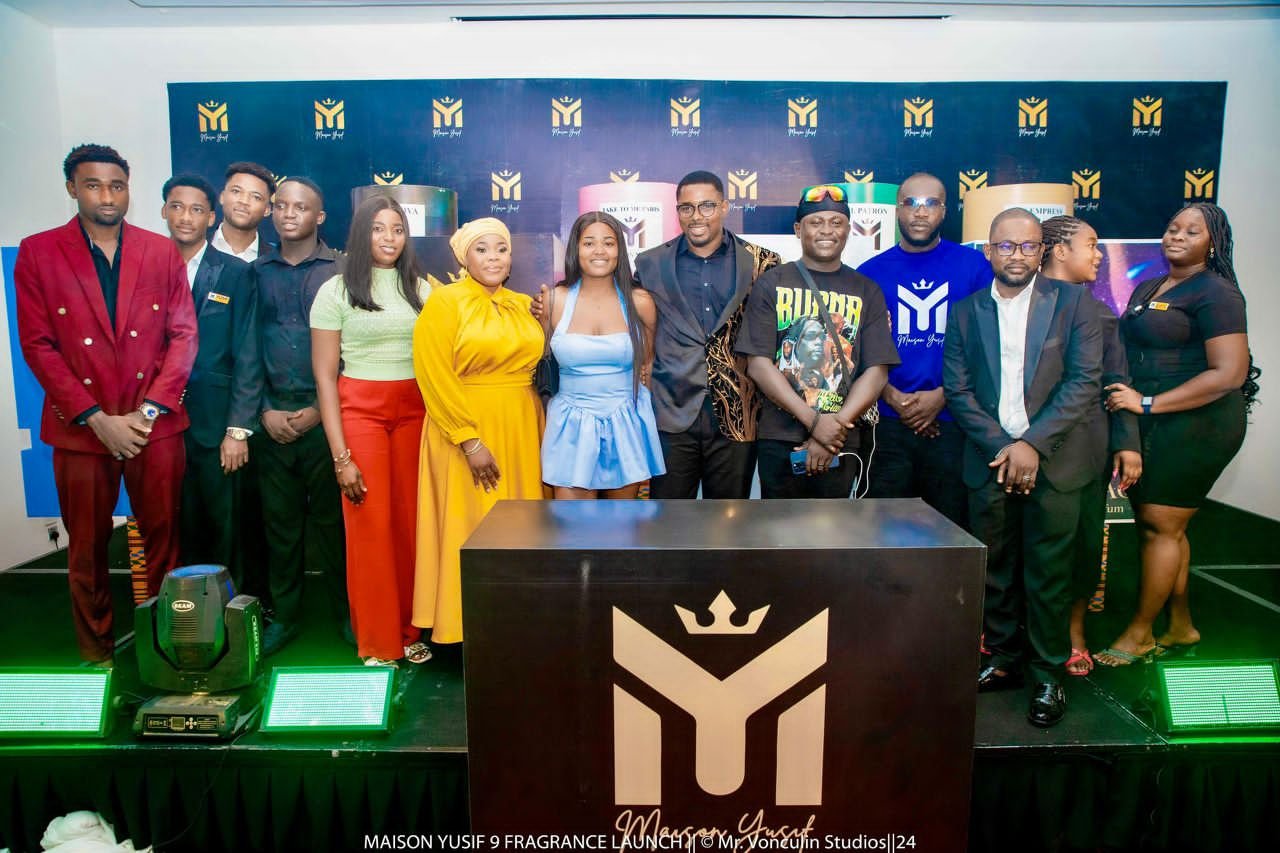News
Maison Yusif unveils nine captivating fragrances

Yusif Meizongo Jnr, the Chief Executive Officer of Maison Yusif, the leading fragrance house in the country has unveiled nine unique and evocative perfumes adding to his numerous creations.
The unveiling saw electrifying performances from Afrobeat sensation Kelvynboy and the Rockstar Kuami Eugene.
The nine fragrances namely the Black Excellence, the Voyager, the Empress, If Sex Was a Perfume, De Ja Vu, Tulaale, El Patron, Take Me to Paris Exclusif and Supernova reflects the brand’s unique blend of cultural richness, charismatic style and creative expression.
Each perfume gives a unique scent for easy identification and it’s crafted to evoke emotion and embody themes of confidence, lasting impression and adventure.
Launching the new fragrances in Accra on Sunday, Mr Meizongo Jnr expressed the need for Ghanaians to boost the level of their confidence by patronising from his fragrance house.
He said the nine fragrances make a statement and enhance the body’s passion while drawing attention with its mild and tender extraordinary scents.
“Each fragrance is not merely a perfume but a celebration of indigenous culture, captured in scents that transcend time and place,” Mr Meizongo Jnr added.
The occasion also drew hundreds of fragrance enthusiasts and notable personalities from Ghana and the showbiz industry.
Prominent figures like Andy Dosty, Ama Burland and Dr. Likee added to the celebratory atmosphere.
News
Nkonya descendants coming home from Diaspora
From the ancestral hills of Nkonya, a global call to remembrance is rising.
This October, the quiet village of Kromo (now Tepo) will become the epicenter of a transcontinental memorial as Ghana and the United States jointly launch African Holocaust Month-a solemn tribute to the millions of African lives lost to the transatlantic slave trade.
Held annually on the second Saturday of October, the ceremony this time will unfold simultaneously in Kromo, Ghana, and Kentucky, USA, with commemorative benches placed facing each other across the Atlantic.
At exactly 4pm Ghana time, libations will be poured, wreaths laid, and names of the departed read aloud—restoring dignity to those whose stories were silenced by history.
But this is more than ritual. It is prophecy fulfilled. Kromo, once a thriving community along the slave route from Salaga, bears the scars of betrayal.
Oral history recounts a tragic moment when slave traders raided the village during a hunting absence, capturing youth aged 16 to 20—including a revered Queen mother and her attendants.
The grief-stricken community relocated, giving birth to present-day Tepo.
For generations, the people of Nkonya prayed that the Queen mother’s descendants would return—not just in body, but in royalty.
That prayer was answered in 2007, when Ur Aua Hehimetu Ra Enkamit, Paramount King of the Ausar Auset Society in Washington, D.C, USA, returned to Nkonya following a DNA test.
He was formerly known as Dr Lee Cook Jr.
A direct descendant of David Cook (e) of Kentucky, his lineage traces back through five generations to Edmon Cooke, whose roots are believed to pass through Kromo.
“This is not just a memorial— it’s a restoration of ancestral ties,” said Ur Aua Enkamit in a chat with The Spectator.
“Kromo is both literal and symbolic. Even if your ancestors didn’t pass through here, it represents every nameless place Africans were captured and marched toward the coast,” he emphasised.
The initiative invites all people of African descent—whether from Ghana, Jamaica, the U.S., or beyond—to participate.
He encouraged families to identify ancestral land for bench placement, submit names of deceased relatives for the reading, coordinate with diaspora kin for simultaneous ceremonies, and arrive in Nkonya before the event.
Benches, he stressed, would be provided in Kromo, with wreaths available upon request. Once placed, families need only return each year with names and offerings.
African Holocaust Month draws inspiration from Ida B. Wells, the pioneering journalist who in 1909 used the term “holocaust” to describe atrocities against African people—decades before its association with World War II.
This October, her words echo across oceans, as descendants reclaim memory, identity, and sacred ground.
From Kingsley E. Hope Kumasi
Join our WhatsApp Channel now!
https://whatsapp.com/channel/0029VbBElzjInlqHhl1aTU27

News
Assembly man shot dead in Aboabo

A wave of grief has swept through the Amansie West District over the fatal shooting of the Assembly Member for Aboabo, Samuel Danquah, during a violent clash between residents and armed military personnel at a mining site in Mpatuam on Tuesday.
Samuel Danquah was killed when military men opened fire on angry residents in Mpatuam. Two other people were also shot and are in hospital.
The trouble started on Monday, September 8, when local people said security guards from Asanko Mines killed a miner.
On Tuesday, hundreds of young people blocked the roads to the mining site, demanding justice for the dead man.
Danquah went to the scene to talk to the protesters and calm them down. But when soldiers arrived, they started shooting. Danquah was hit by a bullet and died at the hospital.
“Danquah came to help calm the situation,” said Kwame Sakyi, an Assembly Member for Mpatuam, who saw what happened. “He believed in talking through problems.”
After the shooting, the angry crowd set fire to vehicles and equipment belonging to the mining company. The whole area is now very tensed.
“The situation is out of hand,” Sakyi told reporters. “The youth are devastated. They feel unheard, unsafe, and betrayed. We’ve lost a respected leader and the people are demanding answers,” he added.
This is not the first time such troubles between mining companies and local communities in Ghana has been recorded. Many people living near mines say the companies make money from their land but give nothing back to them.
They complained that the mining is destroying their farms and water sources while they remain poor. When they protest, security forces often use force against them.
Sakyi is asking the government to investigate what happened and find out why soldiers shot at unarmed people. He wants to know why a respected community leader was killed while trying to make peace.
“While mining brings economic opportunities, communities continue to feel left out,” he explained, adding that, “We need better ways for people to talk about their problems without violence.”
Community leaders and civil society groups are also calling on the government to step in and prevent more violence in mining areas.
People who knew Danquah said he was always trying to help solve problems peacefully. His family and friends are shocked that he was killed while trying to prevent a commotion.
The funeral arrangements are being made while the community mourns a leader who died trying to serve his people.
Many opinion leaders believe the incident shows how dangerous the situation has become in Ghana’s mining areas, where conflicts between companies and communities are getting worse instead of better.
From Kingsley Hope, Kumasi
Join our WhatsApp Channel now!
https://whatsapp.com/channel/0029VbBElzjInlqHhl1aTU27










